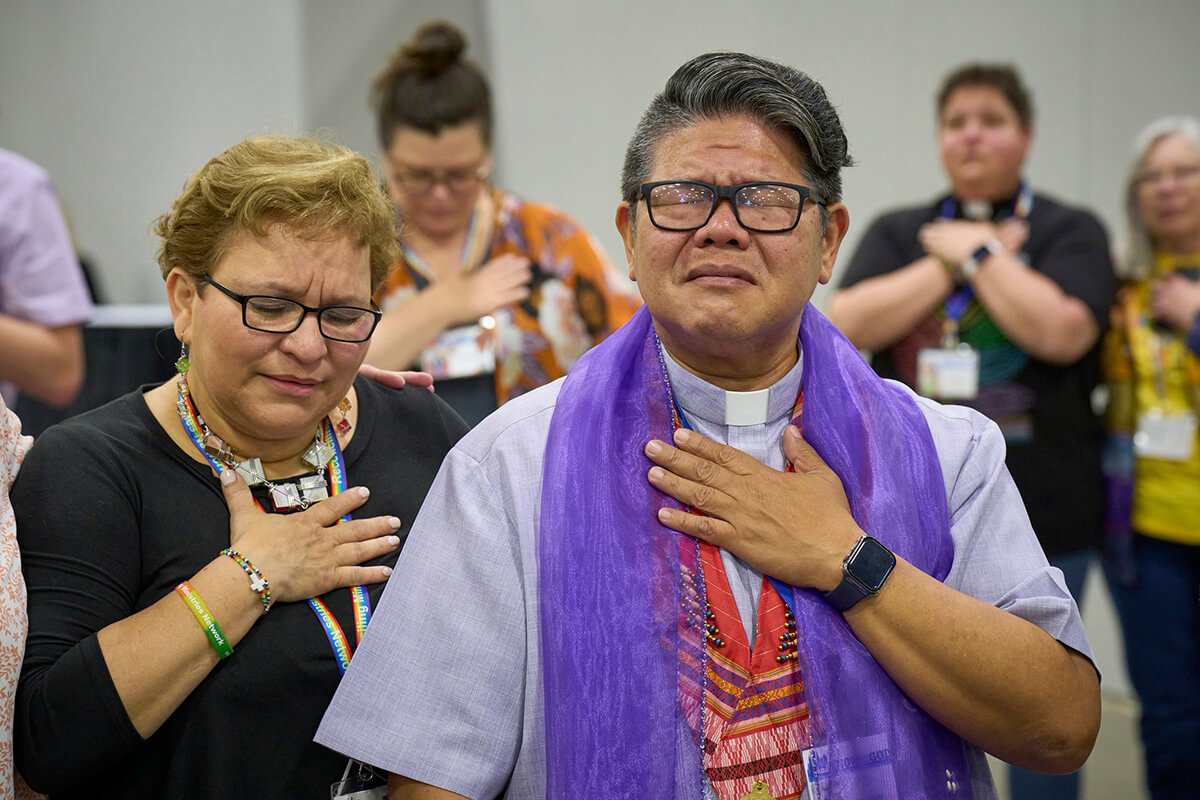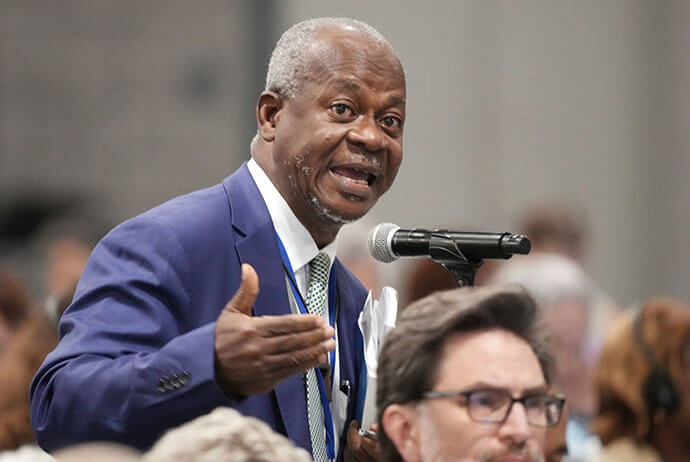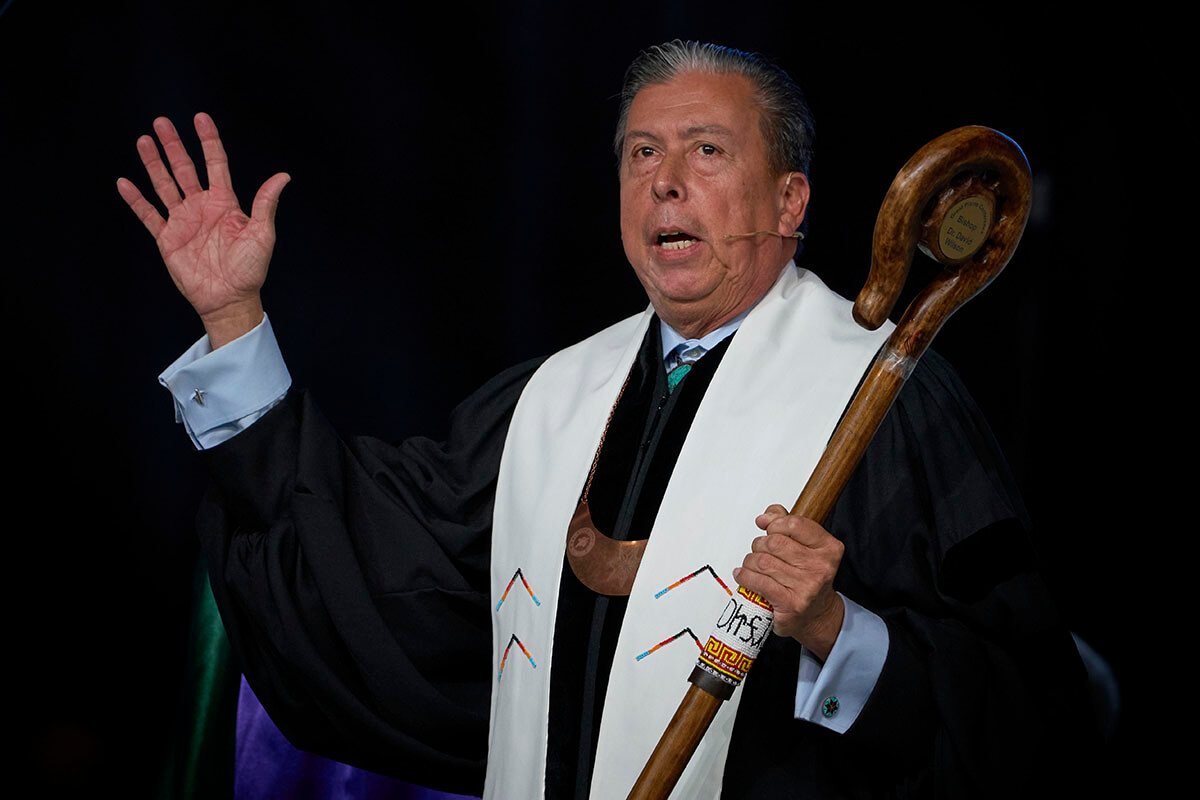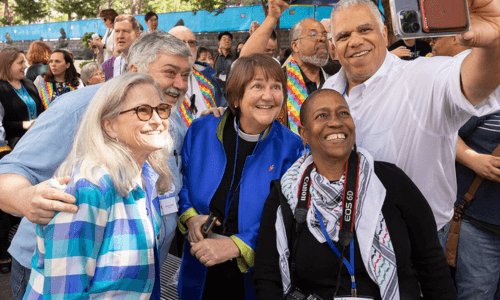During a historic May 1 morning plenary session, one of the sources of heated, often painful, dispute at General Conference for the past 40 years was removed without debate: The denomination’s ban on ordaining “self-avowed practicing homosexuals” has been lifted.
Additional petitions were passed that overturned other longstanding rules prohibiting clergy from officiating same-sex weddings or churches from hosting them. Another vote ended the policy thousands of churches had used to leave the denomination, but created a pathway for churches wishing to return.
Throughout the day following the vote, United Methodists wearing rainbow colors signifying LGBTQ support could be seen taking selfies in front of the Charlotte Convention Center, where a giant banner hanging above the main doorway declares “The United Methodist Church Welcomes You!”
40-year ban on gay clergy struck down

The petition to remove the language — which dates back to 1984 — was passed via consent calendar alongside 22 other pieces of legislation by a vote of 692-51, with approval at 93%.
Delegates and observers applauded after the vote.
Also on the consent calendar, delegates voted that superintendents are not to penalize clergy or churches for holding— or refraining from holding — same-sex weddings.
Another change approved exhorts the Council of Bishops to be inclusive of gender, race, ethnicity, age, people with disabilities, sexual orientation and economic condition in naming representatives to ecumenical organizations.
The legislation approved on this morning’s consent calendar continues the trend of this General Conference, which is quietly reversing some of The United Methodist Church’s longtime restrictions against LGBTQ members.
Nothing passed by General Conference or under consideration would compel churches to receive a gay pastor. The legislation approved today also explicitly protects the right of clergy and churches not to officiate at or host same-sex weddings.
Following the vote, the mood was mostly jubilant in a hastily arranged celebration in a courtyard at the Charlotte Convention Center. However, there was also a slight strain of sadness at the gathering, as those whose potential contributions are forever lost were also remembered.
“It’s really hard not to be standing next to the people who are missing: Folks who have been pushed out of churches, folks who have lost their livelihoods,” said the Rev. Jamie Michaels, pastor of First and Summerfield United Methodist Church in New Haven, Connecticut.
The Rev. Deb Stevens, a retired elder in the West Ohio Conference and board member of the Reconciling Ministries Network, spoke of grief “for those we’ve lost along the way, the people who had their orders taken away, the people who were brought up on charges, the people who despaired and gave up on United Methodism, the people who were told that they were not loved and appreciated by this church.”
Some church members expressed concern about the vote, including the Rev. Chang Min Lee, pastor of Los Angeles Korean United Methodist Church and president of the Korean Association of the United Methodist Church.
“For most Korean American churches that are traditional, we are concerned about today’s vote, but at the same time, we are pleased to see that the legislation approved this morning also explicitly protects the right of clergy and churches not to officiate at or host same-sex weddings,” he said.
The Rev. H.N. Gibson, associate pastor of East Lake United Methodist Church in Birmingham, Alabama, said “there’s still work to do because just because we change legislation doesn’t mean that we change hearts and minds. But I’m committed to that long-term work.”
Disaffiliation agreement ended, return policy adopted

By a vote of 516-203, delegates supported ending the disaffiliation policy added by the special 2019 General Conference and used by more than 7,600 U.S. churches to leave The United Methodist Church. Passing that petition deletes Paragraph 2553 from the Book of Discipline.
Ahead of General Conference, the theologically conservative advocacy groups Good News, Wesleyan Covenant Association and Africa Initiative announced their intent to lobby for disaffiliation to be extended and expanded.
Delegates also approved by a vote of 629-96 a reaffiliation policy to welcome churches that wish to rejoin The United Methodist Church, and adopted by a vote of 593-139 the last of the regionalization petitions aimed at giving the regions equal standing in church decision-making.
New clergy retirement plan approved
A new retirement plan for United Methodist clergy in the U.S. won approval overwhelmingly at General Conference, by a vote of 658-64. The plan is called Compass, and was conceived and championed by Wespath, the denomination’s pension and benefits agency.
Wespath retirement plans going back generations have offered U.S. clergy a monthly pension benefit for life, but Compass is a defined contribution plan — more like a 401(k) offered by corporate employers.
Wespath leaders said the denomination’s steady numerical decline over many years required a new, sustainable approach to supporting retired clergy.
Bishop encourages delegates to inspire next 7 generations

Bishop David Wilson, who oversees the Great Plains Conference and is the denomination’s first Native American bishop, encouraged General Conference delegates to remember the people who inspired their faith in the past, while considering how decisions today can inspire United Methodists far into the future.
Preaching at morning worship, Wilson, who often shares how Indigenous cultures look far into the future as they consider decisions, closed with a story from the six tribes that make up the Haudenosaunee Confederacy in the northeastern United States.
When major decisions must be made, he said, care and attention go into not only thinking about the ramifications for the present or even a year later. Instead, thought is given to what the results of a decision could be to people living seven generations down the road.
“You heard that correctly: the next seven generations,” Wilson said. “What would that look like if we made plans, looking ahead seven generations and how these decisions affect all people? Can you imagine how that would impact this denomination and, most importantly, this world?”
Delegates eliminate formula for number of bishops
Jurisdictions across the United States will have more say about the number of bishops they need, thanks to new legislation that passed during General Conference.
By May 1 of the gathering, the body had passed four of the five petitions recommended by the Jurisdictional Study Committee, eliminating the formula for calculating bishops while guaranteeing at least five bishops per jurisdiction.
In addition to the petitions regarding the formula and the guaranteed number of bishops, three other legislative items passed via consent calendar Tuesday and Wednesday:
- Establish a process for jurisdictions to discern and request any additional bishops needed;
- Declare that if a jurisdiction wants more than five bishops, the jurisdiction, not the denomination, will pay for those additional bishop costs; and
- Authorize the Interjurisdictional Committee on Episcopacy to receive and act on any requests from jurisdictions for additional bishops.
One item that didn’t pass would have shifted episcopal office expenses of jurisdictional bishops from the Episcopal Fund to the annual conferences.
Judicial Council elections
In a break from previous sessions, the General Conference held elections May 1 for all nine spots on the Judicial Council, The United Methodist Church’s top court.
Judicial Council elections are typically staggered for the court’s lay and clergy membership, who serve eight-year terms. The goal is to periodically rotate among whether the majority of members are lay or clergy. But the pandemic has thrown off that schedule and required a reset.
Two current council members were re-elected: the Revs. Øyvind Helliesen of Norway and Luan-Vu Tran of the California-Pacific Conference.
Two other clergy elected are familiar faces on the court. The Rev. Susan Henry-Crowe served on the council for 16 years, was president of the court from 2008 to 2012 and recently retired as the top executive of the United Methodist Board of Church and Society. The Rev. Angela Brown, a former district attorney in the San Francisco area, was elected in 2008 and resigned in 2016 when she was ordained a deacon in the California-Nevada Conference.
Votes of note
In the May 1 morning plenary session, delegates approved a resolution condemning racial-ethnic discrimination and gender-based violence against Asian Americans.
Submitted by the New Federation of Asian American United Methodists, the resolution condemns increasing discrimination against racial-ethnic minorities, especially Asian Americans, during the COVID-19 pandemic and beyond.
Despite ongoing advocacy and legislation to combat anti-Asian racism, about a third of Asian Americans and Pacific Islanders say they have experienced an act of abuse based on their race or ethnicity in the last year, including being on the receiving end of verbal harassment, slurs, physical threats or cyberbullying.
In other news
- The May 1 morning worship service concluded with a time of remembrance for 34 bishops, 40 spouses, 29 lay and clergy delegates, eight previous lay and clergy staff, and one Judicial Council member who have died since the last General Conference.
- General Conference attendees sipped solar-powered coffee this week while getting the chance to learn about a new eco-friendly alternate electricity source. The Mobile Solar Power Station, a solar-powered, self-sustaining trailer, launched in October 2023 as a new ministry of the North Georgia Conference. The solar trailer can provide renewable energy while response teams are helping people amid disaster, with the ability to power a 3,000-square-foot house, run refrigerators and medical devices, cool dialysis equipment and help medical centers, all with a reduced carbon footprint, said Tom Staigle, a disaster response volunteer with the North Georgia Conference.
- Bishop Sally Dyck, ecumenical officer of the Council of Bishops, reported May 1 on a breakfast meeting where members of The United Methodist Church and representatives from each of five bilateral partnerships were able to come together to celebrate Methodist Family Day. Dyck said the suggestion for a Methodist Family Day came after the 2016 United Methodist General Conference. “We share our founder John Wesley and the Wesleyan tradition. We have Wesleyan roots,” she said.

